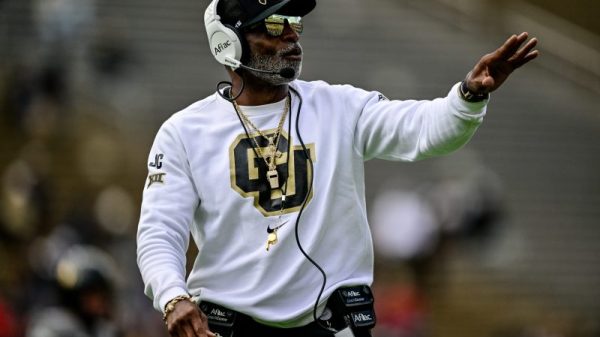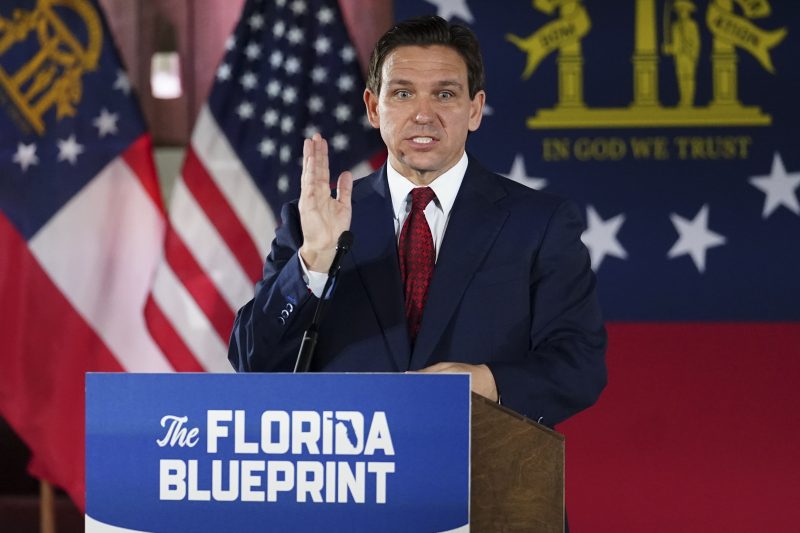After months of speculation, Florida Gov. Ron DeSantis entered the presidential race on Wednesday, joining a burgeoning field vying for the Republican nomination in 2024.
DeSantis, 44, made little secret of his presidential ambitions. Before he was elected governor of Florida in 2018, DeSantis — a Yale graduate who served in the U.S. Navy — served three terms as a congressman representing Florida’s 6th Congressional District. In November, he won reelection to a second term as governor in a landslide, defeating Democrat Charlie Crist by more than 19 percentage points. In recent appearances across the country, as well as on a book tour that has served as a de facto campaign, DeSantis has touted what he has called the “Florida blueprint” as his vision for America.
Here’s a look at the policies DeSantis has put in place during his tenure as governor, as well as the culture-war battles he has waged leading up to his presidential campaign launch, that best illuminate what that blueprint would be.
As governor, DeSantis has signed several bills into law targeting the LGBTQ community, including legislation that criminalizes transgender people for using many bathrooms and changing areas that match their gender identity, bans gender-affirming care for minors and targets drag shows and pronouns.
Notably, DeSantis signed a law in July limiting what teachers in Florida’s public schools can discuss about gender identity and sexual orientation. What became known as the “don’t say gay” law triggered similar bills in other state legislatures — as well as a backlash from parents, LGBTQ advocacy groups and corporations. (More on that last one in a bit.)
DeSantis’s measures prompted two advocacy groups this month to issue advisories warning that travel to Florida may be dangerous for members of the LGBTQ community.
“Taken in their totality, Florida’s slate of laws and policies targeting basic freedoms and rights pose a serious risk to the health and safety of those traveling to the state,” Equality Florida said in its advisory.
After some public pressure, executives from the Walt Disney Co. criticized the legislation restricting LGBTQ+ discussion before it was signed into law, prompting a defiant DeSantis to declare that Florida’s policies would not be based “on the musings of woke corporations.” (Left unsaid was Disney’s status as Florida’s largest individual taxpayer and that DeSantis himself got married at Walt Disney World in 2009.)
After the law went into effect, Disney publicly opposed it and said it hoped the measure would be overturned through the courts. What followed was a retaliatory tug-of-war that continues today.
State lawmakers moved to dissolve Reedy Creek, Disney’s special taxing district, and ultimately replaced Reedy Creek’s board members with a new panel whose members were chosen by DeSantis. However, in a last-minute legal maneuver, Disney used a “royal lives” clause to strip the DeSantis-appointed oversight board of much of its power. The entertainment behemoth then sued DeSantis last month, alleging political retaliation, which resulted in a countersuit.
Last month, DeSantis signed a law banning abortion after six weeks of pregnancy, hours after the state legislature passed the bill. The decision was widely seen as a political move to the right by him ahead of his entering the Republican presidential primary race. However, ever since the Supreme Court overturned Roe v. Wade last year, polling suggests that independent voters have shifted their support to candidates who believe most or all abortions should be legal.
DeSantis may have known the new law would not be as palatable in a general election, given how little he has promoted it, even when among the friendliest of conservative audiences. In a speech at the conservative Liberty University the morning after he signed the law, DeSantis made no mention of it. In a recent appearance at a gala for the most prominent antiabortion group in his state, DeSantis spent only about 20 seconds of his 40-minute keynote speech discussing abortion restrictions.
In January, Florida officials rejected a new Advanced Placement course in African American studies, which DeSantis blasted as progressive “indoctrination.” The College Board, which oversees AP curriculum, later said it would revise the course to remove lessons on Black Lives Matter and the reparations movement but denied it was doing so in response to criticisms from the DeSantis administration. DeSantis later threatened to eliminate Advanced Placement classes in the state entirely.
The decision was part of DeSantis’s campaign against what he has termed “woke” curriculum and came after he signed a bill into law limiting how Florida schools and workplaces teach about race and identity. The bill, called the “Stop Woke Act,” prohibits teachers from discussing race and identity in a way that makes any student feel “guilt or anguish.”
Critics have said that the law is overly broad and that it has resulted in books that address race and identity being removed from schools and libraries — some because of parental challenges, others preemptively by educators seeking to avoid any possible conflict. DeSantis has denied any attempts to ban books in the state, calling it a “hoax.”
DeSantis this month signed a bill into law defunding diversity, equity and inclusion programs in Florida’s public colleges.
Days after a shooting at a private Christian school in Nashville, DeSantis signed into law a bill that made Florida the 26th state to allow people to carry concealed weapons without a permit. Much like when he signed Florida’s six-week abortion ban into law, the permitless-carry bill was signed without fanfare and marked with a brief news release afterward.
“Constitutional Carry is in the books,” DeSantis said.
The White House sharply criticized the new law, calling it “the opposite of common-sense gun safety.” White House press secretary Karine Jean-Pierre cited three high-profile shootings that have occurred in Florida, including the 2018 attack at Marjory Stoneman Douglas High School in Parkland, where 17 people were killed; the 2016 attack at the Pulse nightclub in Orlando, where 49 people were killed and dozens wounded; and a shooting in February that killed a television reporter, a 38-year-old woman and a 9-year-old girl.
“The people of Florida — who have paid a steep price for state and congressional inaction on guns from Parkland to Pulse Nightclub to Pine Hills — deserve better,” Jean-Pierre said.
DeSantis has used both laws and political stunts to crack down on undocumented immigrants. In September, he arranged for dozens of Venezuelan migrants in Texas to be flown to Martha’s Vineyard — part of an ongoing campaign by him and other Republican governors to send migrants to Democrat-heavy cities such as Washington, New York and Chicago.
The migrants who were flown to Martha’s Vineyard later filed a class-action lawsuit against DeSantis and other officials, saying the officials used fraud and misrepresentation to persuade them to travel across state lines. Human rights groups, along with the White House, also condemned the stunt.
Earlier this month, DeSantis announced that he would send 1,000 law enforcement officers to Texas as part of an agreement to help that state with security along the border with Mexico. DeSantis also signed a law cracking down on undocumented immigration to the state, prompting yet another travel advisory — this time from the Latino advocacy group LULAC — warning that Latinos in Florida could face racial profiling under the measure.
DeSantis in March called Russia’s invasion of Ukraine a “territorial dispute” that was a vital interest “for Europe, but not for the United States.” Top congressional Republicans — including Senate Minority Leader Mitch McConnell (Ky.), Sen. Marco Rubio (Fla.) and Sen. Lindsey O. Graham (S.C.) — criticized DeSantis for his characterization of the war. The comments also put him at odds with would-be 2024 rivals, including former vice president Mike Pence, Sen. Tim Scott (R-S.C.) and former ambassador to the United Nations Nikki Haley.
DeSantis later walked back those comments, telling broadcaster Piers Morgan that his remarks had been “mischaracterized” — and leading to more criticism from rivals that he was flip-flopping on the issue.
As part of an aggressive crackdown on voter fraud — one that critics say is unnecessary relative to the amount of voter fraud that occurs in the state — DeSantis launched an elections police force last year. The new Office of Election Crimes and Security has arrested about two dozen people, mostly Black men who had recently voted and were shown to be confused and concerned upon their arrest, according to police body-camera footage.
All of them were charged with voter fraud, a third-degree felony in the state, and face as much as $5,000 in fines and up to five years in prison. Several of those charged told The Washington Post last year that election officials and voter registration groups led them to believe that they were eligible to vote after the state’s 2018 amendment to restore felons’ voting rights. Some of their attorneys said Florida seemed to target their clients for honestly misunderstanding the law.
DeSantis’s railing against restrictions during the coronavirus pandemic is arguably what helped his profile rise in conservative circles. As governor, he consistently resisted or outright opposed coronavirus mitigation measures in Florida, such as masking, lockdowns and testing, often calling the steps an assault on individual freedoms.
Amid a surge of cases caused by the delta variant of the coronavirus, DeSantis issued an executive order prohibiting schools from enacting mask mandates, threatening to withhold funding if they did so. During a surge driven by the omicron variant, DeSantis said testing asymptomatic people was merely “lockdown by stealth.”
DeSantis refused to disclose whether he had received a booster shot, prompting even former president Donald Trump — whose base comprises much of the anti-vaccination contingent — to mock DeSantis as “gutless.” The governor also put out statewide guidance advising “against wearing facial coverings in a community setting” — and once berated a group of high school students for wearing masks around him.
DeSantis’s rising star has put him in Trump’s crosshairs. Trump announced his reelection campaign in the fall and has since preemptively and relentlessly targeted the governor in his speeches and on social media.
DeSantis, once a vocal supporter of Trump, has distanced himself from the former president after it became apparent that the two would be likely rivals in the 2024 GOP presidential primary. The enmity has been reciprocated: Trump, who claims credit for DeSantis’s rise in the GOP, has mocked the Florida governor as “Ron DeSanctimonious” and released a steady barrage of attacks on DeSantis targeting his policies, his personality, the way he reportedly eats chocolate pudding and more.
DeSantis’s attacks on Trump have been more subtle but no less biting. He reportedly has billed himself as “Trump without the drama.” Asked in March about the possibility of a Trump indictment, DeSantis criticized Manhattan District Attorney Alvin Bragg (D) — but also couldn’t resist making references to the investigation into Trump’s role in hush money payments to adult-film actress Stormy Daniels.
“Look, I don’t know what goes into paying hush money to a porn star to secure silence over some type of alleged affair — I just, I can’t speak to that,” DeSantis said, prompting laughter and applause from the audience.
Lori Rosza, Aaron Gregg, Tim Craig, Hannah Knowles, Andrea Salcedo and Caroline Kitchener contributed to this report.



























